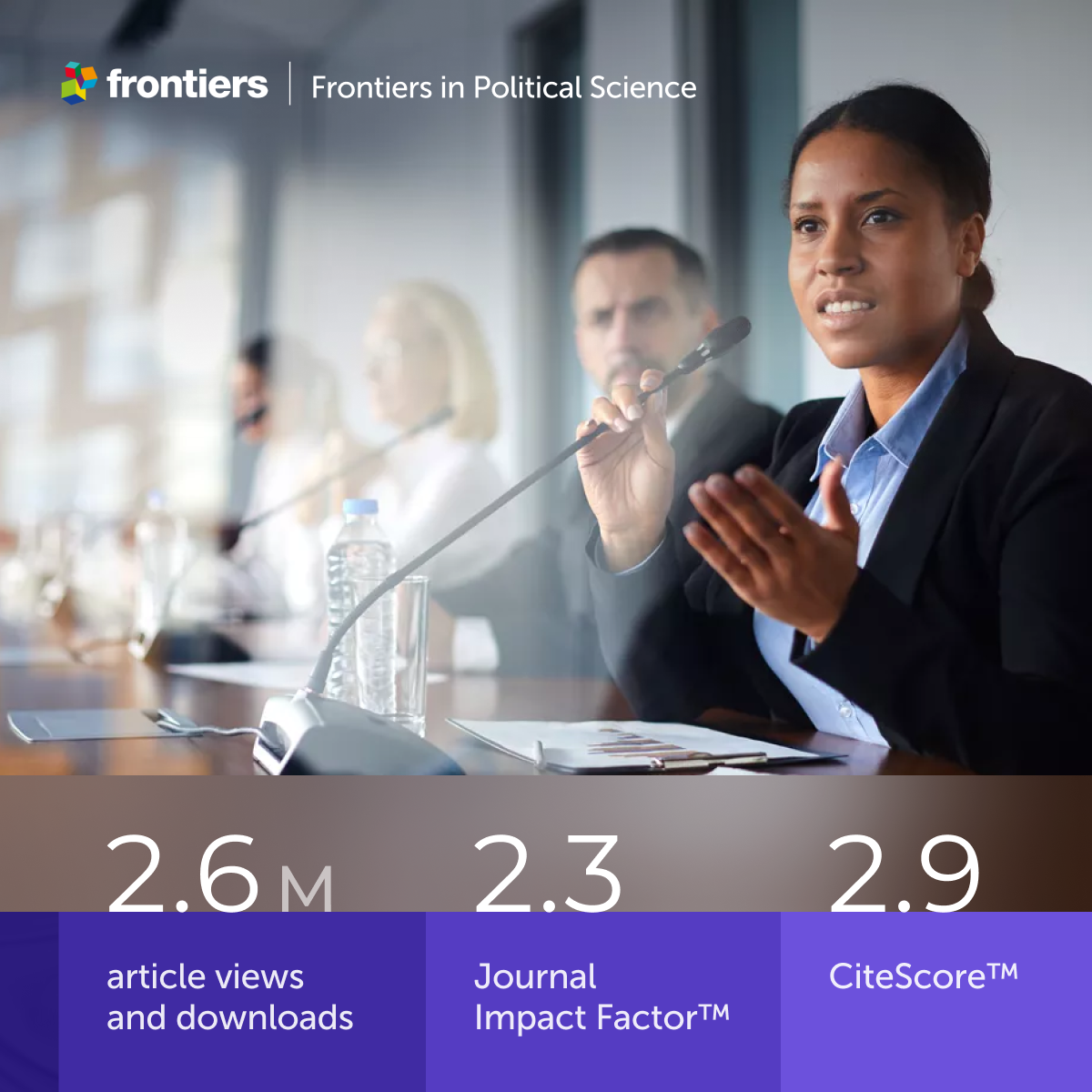.png)
Theme
Issues surrounding democratization and autocratization persist as pivotal challenges in contemporary political landscapes. Samuel Huntington notably coined the term "third wave" to describe the widespread democratic transitions occurring across the globe from the 1970s to the early 1990s. However, scholars have since observed a counter-trend, marked by movements toward autocracy in various regions since the 2000s. The current landscape is characterized by upheavals, including violent government overthrows, the erosion of democratic institutions by autocratic forces, substantial contestation of established power structures, and a prevailing disillusionment among segments of the population regarding liberal democratic institutions.
Organizing a conference on this critical theme in 2024 holds particular significance. This year marks the 50th anniversary of the Carnation Revolution in Portugal, an event identified by Huntington as the starting point of the “third wave” of democratization. Additionally, the International Political Science Association (IPSA) celebrates its 75th anniversary since its establishment in 1949. As an organization dedicated to advancing political science research globally, it is fitting for IPSA to host a three-day conference on the topic of democratization and autocratization in Lisbon, Portugal—the very location where the initial gunshot of the third wave of democratization resonated.
Against this backdrop, our three-day conference aims to delve into various facets of democratization and autocratization worldwide. We extend an invitation for papers and panels analyzing any aspect related to democratization and autocratization, spanning any region and time period, on individual case studies or with a comparative approach in any of the following areas:
- Elections and parties (party systems) in democratization and/or autocratization.
- Autocratization, populism and radical right/left parties.
- Autocratization trends and the quality of democracy.
- Democratization, autocratization, judiciary and rule of law.
- The economy in the democratization/autocratization processes.
- The military in the democratization and autocratization processes.
- The role of international relations in democratization/autocratization.
- The role of values, emotions, and cultural wars in democratization and autocratization.
- Migrations in democratization and/or autocratization processes.
- Public policy and democratization/autocratization.
- Gender in democratization/autocratization processes.
- Nationalism and ethnicity in democratization and autocratization.
- The impact of autocratization on the governance process.
Program Committee
Pablo Oñate
(Committee chair) IPSA President; Professor of political science at University of Valencia (Valencia, Spain)
Yuko Kasuya
IPSA President-Elect, Professor of political science at Keio University (Tokyo, Japan)
Dianne Pinderhughes
IPSA Past-President, Professor of political science at University of Notre Dame (Indiana, United States of America)
Madalena Meyer Resende
IPSA Vice-President, Professor of political science at NOVA University of Lisbon (Lisbon, Portugal)
Keiichi Kubo
IPSA Committee for Research and Training Chair, Professor of political science at Waseda University (Tokyo, Japan)
Hasret Dikici-Bilgin
IPSA Summer Schools Coordinator, Professor of political science at Istanbul Bilgi University (Istanbul, Türkiye)
Daniel Stockemer
IPSR Co-editor, Professor of political science at University of Ottawa (Ottawa, Canada)
Video
Important Dates
| 27 February 2024 | Call for Proposals Opens |
| 10 April 2024 | Deadline to Submit Proposals (Papers and Closed Panels) |
| 15 May 2024 | Registration Opens |
| 15 May 2024 | Acceptance or Rejection Notifications (sent by email to the individual who submitted the proposal) Note: Due to the high volume of proposal submissions, the date to send notifications has been extended. |
| 3 July 2024 | Registration Deadline to Remain in the Program For all authors of papers accepted in the program. Unregistered panelists will be removed from the conference program. |
| 15 August 2024 | Deadline to Register for the Conference |
| 28 August 2024 | Deadline to Submit Paper |
| 11-13 September 2024 | Conference Dates |
Venue
Calouste Gulbenkian Foundation
Av. de Berna 45 A, 1067-001
Lisboa, Portugal
MAP
Universidade NOVA de Lisboa
Faculdade de Ciencias Sociais e Humanas (FCSH)
Av. de Berna 26 C, 1069-061
Lisboa, Portugal
MAP
Conference Partner
Supporter

Sponsor


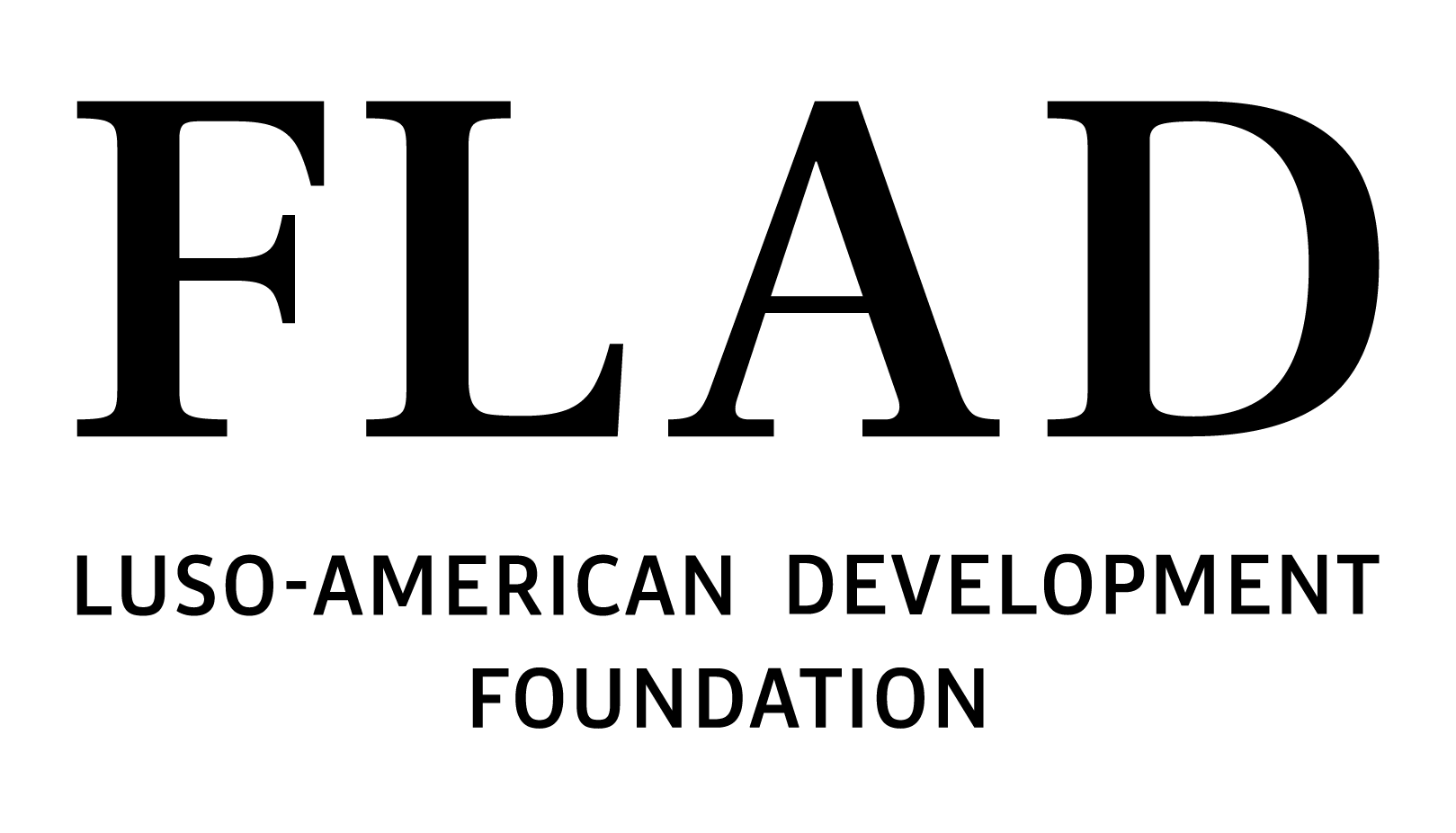
Exhibitors
IPSA’s 75th anniversary conference on Democratization and Autocratization kicked off at the Gulbenkian Foundation and NOVA University in Lisbon, Portugal, on 11 September. The conference was presented with support from the Gulbenkian Foundation and in partnership with the Portuguese Political Science Association (APCP). Also sponsoring the event were the Konrad Adenauer Foundation Spain/Portugal Office, Turismo de Lisboa, and the Luso-American Development Foundation. Finally, Brill, Verlag Barbara Budrich, Cogitatio Press, and Frontiers in Political Science were present as exhibitors. We extend our heartfelt appreciation to our conference partners, supporters, sponsors and exhibitors for their invaluable contributions to this international event.
The Democratization and Autocratization: IPSA 75th Anniversary Conference featured a keynote address, 6 roundtables, and 363 papers were presented across 78 panels. The event attracted 486 participants from 67 countries, including leading scholars, government and city officials, and diplomats, to discuss a wide range of topics related to democratization and autocratization.
Program
The Program (PDF document) is organized by date and time and includes the list of paper presentations or speakers in each panel.
Conference Photos
Selected conference photos are available on IPSA’s Flickr account.
The video recordings of the keynote address, most of the IPSA/LOC roundtables, opening and closing remarks will be available soon.
Certificates of Participation
A certificate of participation has been issued to conference participants who attended the conference. Participants who attended the event received an e-mail with an access link to their certificate on 25 September 2024. If you did not receive this communication, please contact us at events@ipsa.org.
Schedule Overview
11 September 2024 | 08:30 – 20:00
| ROOM | Auditorium 2 Gulbenkian Foundation |
Auditorium 3 Gulbenkian Foundation |
Sala 1 Gulbenkian Foundation |
Sala 2 Gulbenkian Foundation |
Sala 3 Gulbenkian Foundation |
Sala SD Gulbenkian Foundation |
C003 NOVA (FCSH-UNL) |
| 08:30 – 19:00 | Registration | ||||||
| 09:00 – 09:30 | Opening Remarks | ||||||
| 09:45 – 11:15 | R-063 [LOC Roundtable] Lusophone African Democracies, 50 years after Portugal's Democratic Transition | P-010 [RC13] Democratization and Autocratization - Multidisciplinary Approaches | P-072 Trends in Polarization and Polarized Politics | P-077 Electoral Manipulation and the Erosion of Democracy | P-023 Civil-Military Issues in the Waves of Democratization and Autocratization | P-046 Paths to Authoritarianism: Beyond Deep State and Corporate Elites - Exploring a Multitude of Factors in Democratic Decline | |
| 11:15 - 11:30 | Break | ||||||
| 11:30 – 13:00 | R-020 Autocratization Studies in the XXI Century: Taking Stock, Looking Ahead (Roundtable) | P-001 [LOC] A New Portuguese Electorate? The 2024 Legislative Elections | P-012 [RC13/RC34] Regional and Cross-regional Perspectives on Autocratization | P-090 Civil-Military Relations and Politics | P-086 Leaders and Elites in Democratic and Autoritarian Regimes | P-085 Politics of Health and Regime Change | P-074 Challenges to Democracy and Autocratization Trends |
| 13:00 – 14:00 | Lunch | Funding opportunities at the European Research Council (ERC) | Lunch | ||||
| 14:00 – 15:30 | P-102 Populism and Democratic Backsliding | P-045 Navigating the Crossroads of Democracy and Autocracy in Asia | P-087 Globalization and International and Regional Solidarity | P-021 Backslides and Internal Initiatives for Democratization in the Middle East | P-096 Varieties of Autocratic Governance | P-104 Case Studies in Regime Change | P-022 Between Democratization and Autocratization: Lessons from Middle East Region |
| 15:30 - 15:45 | Break | ||||||
| 15:45 – 17:15 | P-011 [RC13/RC34] Challenges to Democracy in Latin America | P-006 [LOC] The Old and the New Right and the Legacies of Authoritarianism in Contemporary Portugal | P-091 Electoral Processes and Democratization / Autocratization Trends | P-075 Democratic Backsliding, Autocratization and Re-Autocratization | P-025 Colonial Legacies and Democratization Pathways in the Lusophone World | P-076 Presidents and Executives in Democratization and Autocratization | P-030 Democracy & Autocracy: Blurring the Boundary |
| 17:15 - 17:30 | Break | ||||||
| 17:30 – 18:30 | Keynote Speaker - Adam Przeworski | ||||||
| 18:40 - 20:00 | Reception | ||||||
12 September 2024 | 08:30 – 18:15
| ROOM | Auditorium 2 Gulbenkian Foundation |
Auditorium 3 Gulbenkian Foundation |
Sala 1 Gulbenkian Foundation |
Sala 2 Gulbenkian Foundation |
Sala 3 Gulbenkian Foundation |
Sala SD Gulbenkian Foundation |
C003 NOVA (FCSH-UNL) |
| 08:30 – 17:00 | Registration | ||||||
| 09:00 – 10:30 | R- 067 [IPSA Past-Presidents Roundtable] Reflections on Leadership and IPSA at 75 Years | P-070 Rule of Law and Politics | P-034 Digital Authoritarianism: Actors and Practices in Africa and Asia | P-024 Civilian Control in the Times of Democratization and Autocratization | P-059 Turkiye: Democratic Resilience or Ruptures in Autocratization | ||
| 10:30-10:45 | Break | ||||||
| 10:45 – 12:15 | P-017 [RC51] Domestic Institutions and the Management of Autocratic Trends | R-064 [LOC Roundtable] Portraits of Regime Changers in Portugal's Carnation Revolution | P-033 Democratization against Democracy: Rethinking Governance Alternatives for the Middle East | P-078 Gender in Democratic / Authoritarian Trends | P-051 Protectionism, Between Populism and Economic Nationalism | P-009 [RC 48] Transformation of Administrative Procedures and Processes To Enhance Democratization | P-057 The Impact of Increasing Authoritarian Conservatism on Gender Regime in Turkey |
| 12:15 – 13:15 | Lunch | ||||||
| 13:15 – 14:45 | P-081 Migration in Democratization and Autocratization Proccesses | P-002 [LOC] Corruption, Political Trust, and Support for Democracy – A Comparative Perspective | P-049 Political Representation and Democratic Accountability in the Global South | P-048 Political Discourse and Attitudes in Democratization / Autocratization Processes | P-014 [RC24] Civil-Military Relations in and Era of Ideological Great Power Competition | P-088 Public Policy and Administration in Regime Change | P-031 Democracy vs. Violence: Institutions, Organized Crime, and Politics |
| 14:45 - 15:00 | Break | ||||||
| 15:00 – 16:30 | P-095 Citizens and Identities in Democratization / Autocratization Trends | R-065 [LOC/FLAD Roundtable]: Revisiting Juan Linz's Theories of Regimes | P-098 Information, Media and Cultural Wars | P-089 Transitions to/from Democracy | P-013 [RC24] Autocratization and Democratization: Issues in Comparative Civil-Military Relations and Regional Security | P-035 Education for Democracy in Scope of Human Rights | P-029 Deliberative Practices and Political Decisions at Local Level |
| 16:30-16:45 | Break | ||||||
| 16:45 – 18:15 | P-083 Nationalism and Ethnicity in Democracy and Autoritarism | P-003 [LOC] Corruption, Political Trust, and Support for Democracy – The Case of Portugal | P-097 Political Attitudes and Behavior in Democratic Backsliding | P-094 Political Legitimacy and Political Regime Change | P-073 Technology Instruments in Authoritarianism | P-039 Exploring the Potential for Democratic Innovation in South Korea | P-099 Political Parties and Regime Change |
13 September 2024 | 08:30 – 17:45
| ROOM | Auditorium 2 Gulbenkian Foundation |
Auditorium 3 Gulbenkian Foundation |
Sala 1 Gulbenkian Foundation |
Sala 2 Gulbenkian Foundation |
Sala 3 Gulbenkian Foundation |
Sala SD Gulbenkian Foundation |
C003 NOVA (FCSH-UNL) |
| 08:30 – 17:00 | Registration | ||||||
| 09:00 – 10:30 | R-066 [IPSA Roundtable] Conversation on "The impact of political science in society: Could we do better?" | P-004 [LOC] Democracy and Dictatorship after Social Revolution, War, and Empire: Short and Long Run Legacies I | P-101 Populism and the Erosion of Democracy | P-082 Foreign Policy and Democratic Backsliding | P-084 Political Economy and Regime Change | P-043 Historical Trajectories of Democratic Innovations | |
| 10:30 - 10:45 | Break | ||||||
| 10:45 – 12:15 | P-015 [RC34] Democracy Promotion in Times of Autocratization | P-005 [LOC] Democracy and Dictatorship after Social Revolution, War, and Empire: Short and Long Run Legacies II | P-047 Perils of Direct Democracy | P-100 Political Economy and Democratic Backsliding | P-062 When Paradiplomacy Democratizes Foreign Policy: Assessing the Challenges and Opportunities of Bringing Democracy to the Foreign Action | P-041 Geopolitical Transition, Existential Conflicts and Clashes Among Regional and Major Powers | |
| 12:15 – 13:15 | Lunch | ||||||
| 13:15 – 14:45 | P-071 Opposition Politics | P-052 Religious Actors in the Third Wave of Autocratization | P-093 Gender in Democratization / Autocratization Dynamics | P-103 Struggle for Democracy in Authoritarian Contexts | P-050 Populist Narratives and Political Cultures: Disputing Hegemony through Political Myth and Emotions | P-061 What International Impact for Parliamentary Actors? Findings from Empirical Studies | |
| 14:45 - 15:00 | Break | ||||||
| 15:00 – 16:30 | P-092 Civil Society and Democracy | P-016 [RC34] Democratic Resilience and Resistance to Autocratization | P-042 Global Struggle for Democratic Values: From Heritage to Narratives and Institutions | P-079 The International Perspective in Democratizations and Autocratizations | P-028 Defending Democracy: Higher Education Challenges in an Age of Increasing Authoritarianism | P-036 Emerging Dynamics of Opposition in the Face of Authoritarian Learning in the Middle East and North Africa | |
| 16:30-16:45 | Break | ||||||
| 16:45 – 17:15 | Closing Remarks | ||||||
Day 1 | 11 September 2024
Opening Remarks
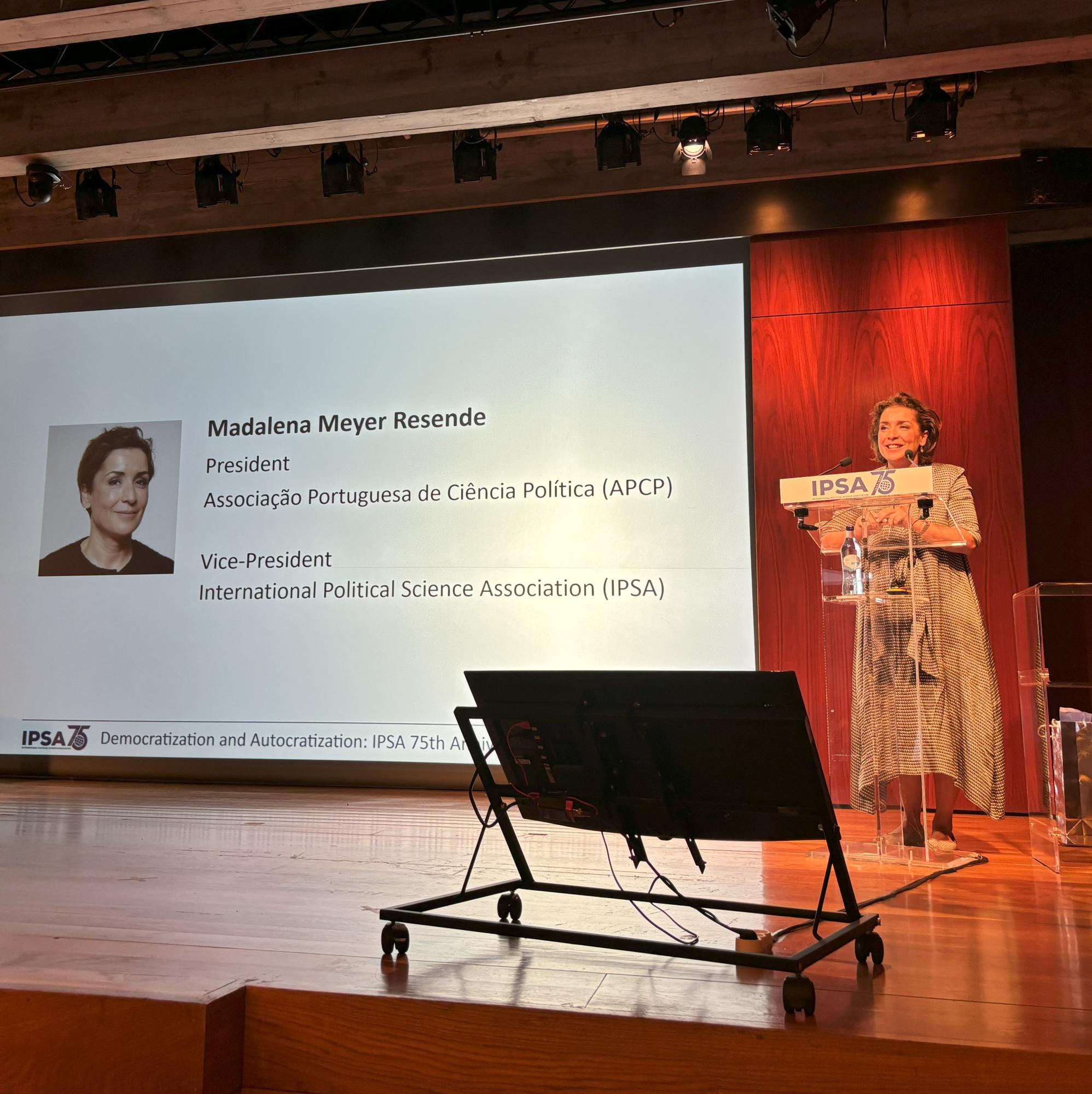 Madalena Meyer Resende, President of the Portuguese Political Science Association (ACPC) and Head of the Local Organizing Committee (LOC) for the 75th Anniversary Conference opened the conference by welcoming the participants to Lisbon. In her address, she expressed how pleased she was to finally welcome IPSA members to a conference in Lisbon, following the cancellation of the 2020 IPSA World Congress due to the COVID-19 pandemic. She reflected on the close collaboration between the ACPC and IPSA, and how pleased she was to host an IPSA event in Lisbon on the theme of Democratization during the 50th Anniversary of the Carnation Revolution.
Madalena Meyer Resende, President of the Portuguese Political Science Association (ACPC) and Head of the Local Organizing Committee (LOC) for the 75th Anniversary Conference opened the conference by welcoming the participants to Lisbon. In her address, she expressed how pleased she was to finally welcome IPSA members to a conference in Lisbon, following the cancellation of the 2020 IPSA World Congress due to the COVID-19 pandemic. She reflected on the close collaboration between the ACPC and IPSA, and how pleased she was to host an IPSA event in Lisbon on the theme of Democratization during the 50th Anniversary of the Carnation Revolution.
 IPSA extends special thanks to the Konrad Adenauer Foundation (KAS) Spain/Portugal Office and its director, Ludger Gruber, for its generous contribution to the Conference. Martin Friedek, Project Coordinator at KAS Spain/Portugal, represented the foundation and delivered opening remarks, emphasizing the long-standing collaboration with IPSA, and especially through its office in Canada. Mr. Friedek also highlighted the Konrad Adenauer Foundation’s commitment to promoting democracy through political education and addressed issues such as the decline of democracy in consolidated democracies and the rise of populism worldwide.
IPSA extends special thanks to the Konrad Adenauer Foundation (KAS) Spain/Portugal Office and its director, Ludger Gruber, for its generous contribution to the Conference. Martin Friedek, Project Coordinator at KAS Spain/Portugal, represented the foundation and delivered opening remarks, emphasizing the long-standing collaboration with IPSA, and especially through its office in Canada. Mr. Friedek also highlighted the Konrad Adenauer Foundation’s commitment to promoting democracy through political education and addressed issues such as the decline of democracy in consolidated democracies and the rise of populism worldwide.
 IPSA President Pablo Oñate officially opened IPSA’s 75th Anniversary Conference in Lisbon, thanking the Program Committee and LOC members, the Secretariat staff, the over 500+ participants as well as the exhibitors and partners. He also reflected on the Association’s evolution since its founding in 1949, noting its remarkable growth in membership, global reach, and progress toward gender equality and diversity. He underscored the vital role political scientists play in tackling contemporary challenges, particularly the erosion of democratic institutions and the rise of autocratization.
IPSA President Pablo Oñate officially opened IPSA’s 75th Anniversary Conference in Lisbon, thanking the Program Committee and LOC members, the Secretariat staff, the over 500+ participants as well as the exhibitors and partners. He also reflected on the Association’s evolution since its founding in 1949, noting its remarkable growth in membership, global reach, and progress toward gender equality and diversity. He underscored the vital role political scientists play in tackling contemporary challenges, particularly the erosion of democratic institutions and the rise of autocratization.
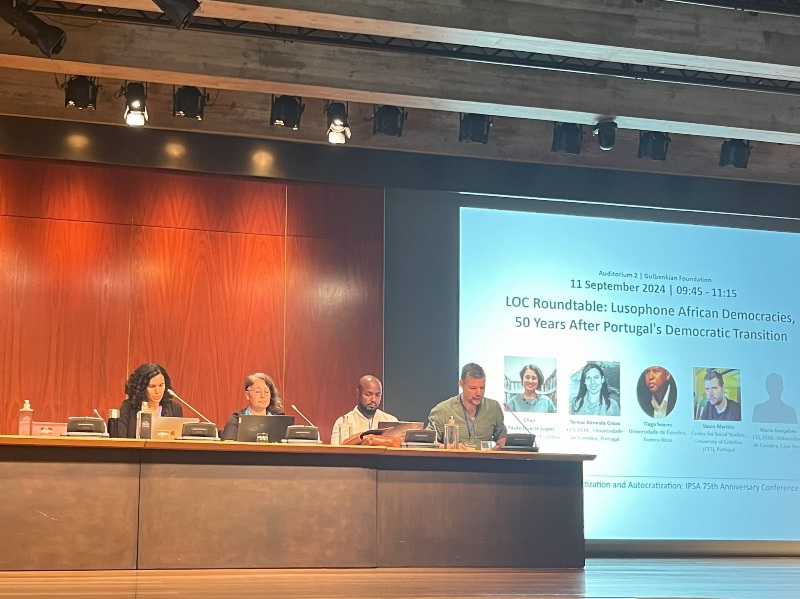
LOC Roundtable - Lusophone African Democracies, 50 Years After Portugal's Democratic Transition
Following the opening remarks, the conference featured the first LOC roundtable on Lusophone African Democracies, 50 years after Portugal's Democratic Transition, chaired by Paula Duarte Lopes (Universidade de Coimbra, CES, FEUC, Portugal). The roundtable examined the democratic developments of Portuguese-speaking Angola, Cape Verde, and Mozambique, fifty years after Portugal’s democratic transition. Despite progress, these Lusophone African nations continue to encounter challenges, including corruption, political instability, and limited institutional capacity. The discussion focused on the impact of post-colonial dynamics, external influences, and social and political national forces on the democratic developments in these countries.
The first speaker Vasco Martins (ICSTE-IUL, Portugal) discussed the political landscape in Angola, highlighting the dominance of an elite and the persistence of autocratic governance, with the People's Movement for the Liberation of Angola (MPLA) party maintaining power since the first elections in 1992. Still, the sheer amount of civil society democratic forces is overwhelming.
Mário Gonçalves (Universidade de Coimbra, CES, FEUC, Portugal) offered a perspective on his home country, Cabo Verde, which, despite being seen as a democratic success, faces underlying challenges such as a two-party system that prioritizes political interests over national progress and with civil society mirroring the parties’ autocratic stance, without much space for a critical approach to national politics.
Teresa Almeida Cravo (Universidade de Coimbra, CES, FEUC, Portugal) focused on Mozambique, where the FRELIMO party has remained in power since independence in 1975, despite a civil war and the introduction of a multi-party system in 1992. The FRELIMO governing style has grown more authoritarian as contestation arises. The conclusion is that democracy needs to be analyzed taking into account practices and perceptions, beyond measurable indicators, to enable a better understanding of democracy’s sustainability.
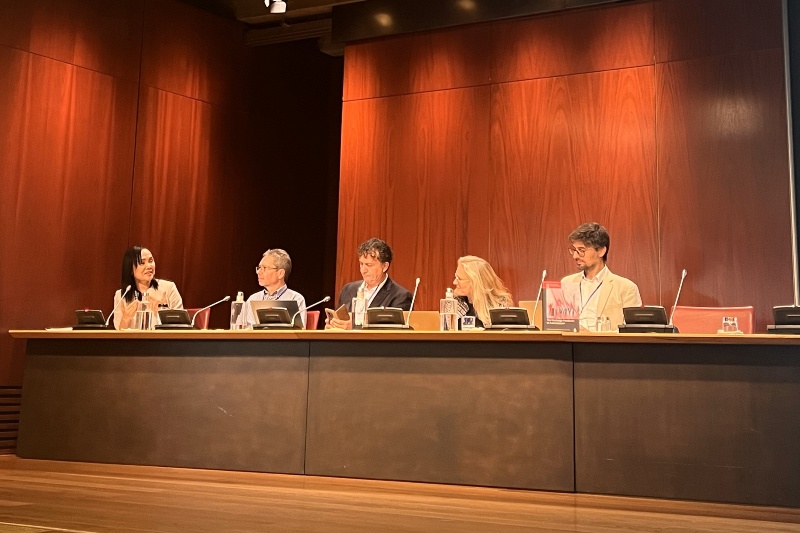
Roundtable - Autocratization Studies in the XXI Century: Taking Stock, Looking Ahead
The second roundtable of the opening day, Autocratization Studies in the XXI Century: Taking Stock, Looking Ahead, was co-chaired by Luca Tomini (Université libre de Bruxelles, Belgium) and Aurel Croissant (University of Heidelberg, Germany), with IPSA President-Elect Yuko Kasuya (Keio University, Japan) serving as discussant. The roundtable focused on the recent scholarship surrounding autocratization, a phenomenon understood as the opposite to democratization, particularly in light of the Handbook of Autocratization published by Routledge in 2024.
Bringing together leading international scholars, the roundtable provided a comprehensive assessment of our current understanding of this phenomenon and highlighted uncharted research avenues in the field of autocratization. The first speaker Murat Somer (Ozyegin University, Türkiye) highlighted the need to develop broader theories on autocratization, suggesting that democratic erosion should be seen as a regime type and managed with context-sensitive strategies.
Andreas Schedler (Central European University, Austria) highlighted the role of early mobilization in countering democratic uncertainty and advocated for a serious approach to this growing trend.
Julia Leininger (German Institute of Development and Sustainability (IDOS), Germany) discussed autocratization in waves, pointing to the role of international factors like economic interdependence in eroding democracy.
Janjira Sombatpoonsiri (Chulalongkorn University, Thailand/GIGA, Germany) focused on the challenges facing civil society activism in the context of sophisticated state repression aided by media actors and data collection.
Finally, IPSA President-Elect Yuko Kasuya drew on her expertise in East and Southeast Asian contexts to contribute to the discussion. She emphasized the importance of focusing more on voters, and encouraging future research from behaviorist scholars to better understand democratic dynamics.
Panels
On the first day, 25 panels addressed a wide range of topics, including the dynamics of democratization and autocratization, electoral manipulation, the rise of authoritarianism, civil-military relations, the impact of populism on democratic backsliding, and the challenges posed by globalization and regional solidarity. Several members of the IPSA Executive Committee (EC) participated in the discussions in various roles, including as chairs, discussants, and paper presenters. IPSA President-Elect Yuko Kasuya chaired the panel Navigating the Crossroads of Democracy and Autocracy in Asia and was also one of the presenters of the Political Polarization and Anti-Democratic Attitudes in Asia paper.
In another panel, IPSA EC member Emilia Palonen served as a discussant for the Populism and Democratic Backsliding session, while IPSA Past President Helen V. Milner presented her paper titled Globalization and the Rise of the Populist Far Right in Europe.
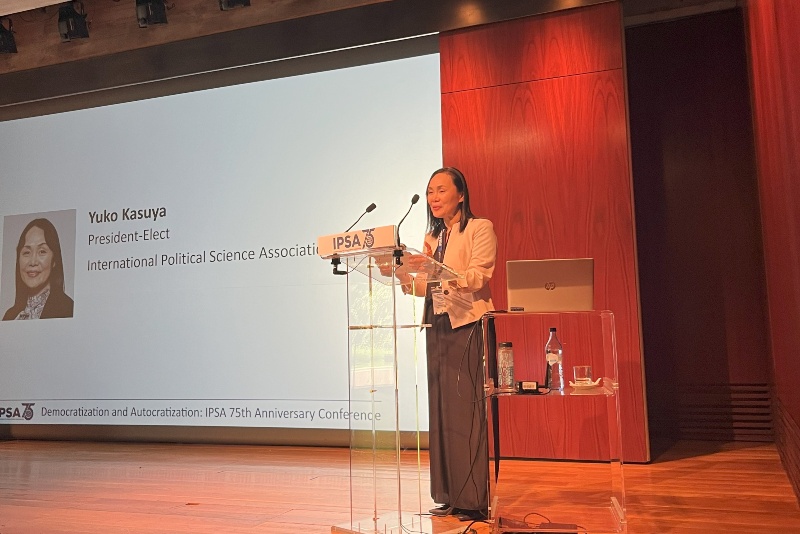
Keynote Address by Adam Przeworski
The highlight of the day was the keynote address by Adam Przeworski, Carroll, and Milton Emeritus Professor of Politics and Economics at New York University. IPSA President-Elect Yuko Kasuya chaired the session and introduced Prof. Przeworski.
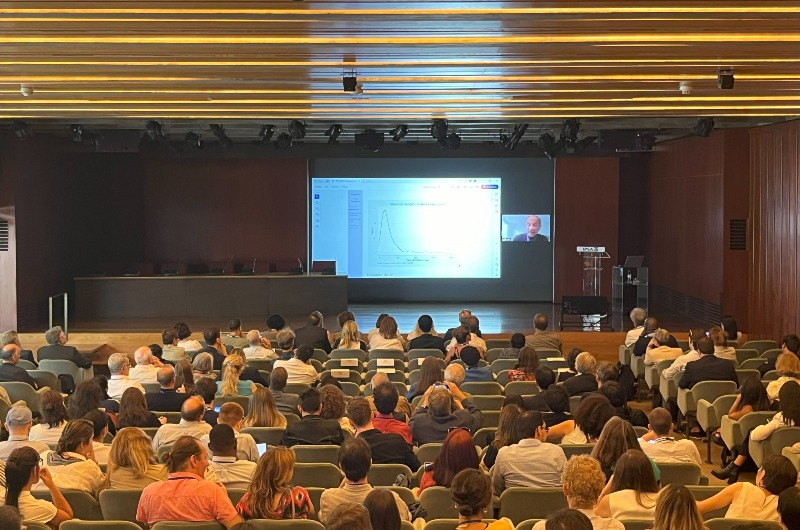 In his keynote address, titled Studying Democracy, Prof. Przeworski reflected on the evolution of democratic thought and explored how our understanding of democracy has evolved in response to real-world challenges, particularly in the post-Cold War era where rival ideologies have faded, but conflicts over values and interests within democracies have intensified. He noted that while many countries have undergone democratic transitions through elections and coups since World War II, 68 countries remain non-democratic. Prof. Przeworski emphasized that democratic stability is at risk when those in power undermine the mechanisms that ensure fair political competition. Unlike the violent democratic breakdowns of the past, such as coups or ideological shifts, today's democratic decline is more subtle. He concluded by emphasizing the need for a unified commitment to the democratic process as the means for resolving conflicts to resist democratic backsliding.
In his keynote address, titled Studying Democracy, Prof. Przeworski reflected on the evolution of democratic thought and explored how our understanding of democracy has evolved in response to real-world challenges, particularly in the post-Cold War era where rival ideologies have faded, but conflicts over values and interests within democracies have intensified. He noted that while many countries have undergone democratic transitions through elections and coups since World War II, 68 countries remain non-democratic. Prof. Przeworski emphasized that democratic stability is at risk when those in power undermine the mechanisms that ensure fair political competition. Unlike the violent democratic breakdowns of the past, such as coups or ideological shifts, today's democratic decline is more subtle. He concluded by emphasizing the need for a unified commitment to the democratic process as the means for resolving conflicts to resist democratic backsliding.
Day 2 | 12 September 2024
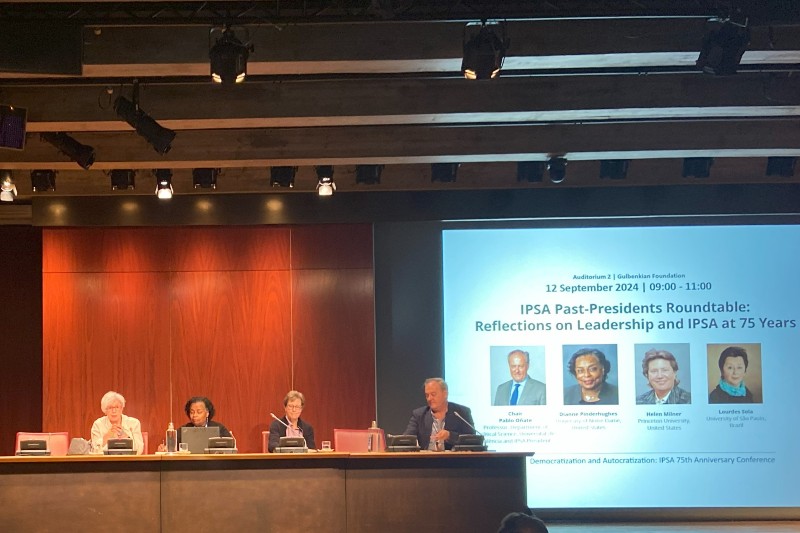
IPSA Past-Presidents Roundtable: Reflections on Leadership and IPSA at 75 Years
Watch the IPSA Past-Presidents Roundtable Video
Day 2 of the Democratization and Autocratization began with the IPSA Past-Presidents Roundtable: Reflections on Leadership and IPSA at 75 Years. Chaired by IPSA President Pablo Oñate, the session brought together IPSA’s three distinguished women Presidents – Dianne Pinderhughes (University of Notre Dame, United States), Helen V. Milner (Princeton University, United States), and Lourdes Sola (University of São Paulo, Brazil) – to discuss IPSA’s legacy and its scholarly contribution to the global political science community.
Since its founding in 1949, IPSA has made significant scholarly contributions to the global political science community by fostering the development of political science worldwide, promoting collaboration between scholars in emerging and established democracies, and supporting academic freedoms. The speakers talked about the transformation of the association during its 75-year history along with the professionalization of the IPSA Secretariat and its progress toward gender equality.
Lourdes Sola (2006-2009) described the organization's progress in diversity, particularly the increased female representation. Prof. Lourdes also highlighted her role in establishing IPSA's first Summer School in Brazil and advocated for enhanced interdisciplinary collaboration to address challenges such as polarization and climate change.
Helen V. Milner (2012-2014) outlined IPSA's growing internationalization and the establishment of its permanent headquarters in Montréal, Canada, which have enhanced global collaboration and knowledge-sharing. Prof. Milner talked about challenges, such as democratic backsliding, that will need greater interdisciplinary collaboration to address future geopolitical tensions.
Finally, Dianne Pinderhughes (2021-2023) shared some insights into IPSA's evolution, noting the significant progress in diversity and global representation compared to its early, male-dominated days. Prof. Pinderhughes addressed challenges such as managing the impact of the pandemic and discussed the importance of financial sustainability.
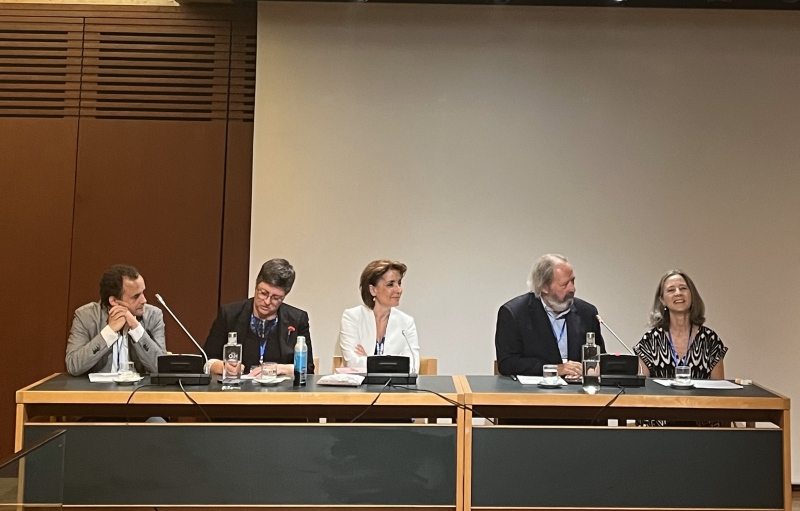
LOC Roundtable: Portraits of Regime Changers in Portugal's Carnation Revolution
Watch the LOC Roundtable: Portraits of Regime Changers in Portugal's Carnation Revolution Video
Chaired by Madalena Meyer Resende (President of the Portuguese Political Science Association (APCP) and Head of the Local Organizing Committee [LOC), the LOC Roundtable, Portraits of Regime Changers in Portugal's Carnation Revolution, examined the roles of three key regime changers in Portugal's Carnation Revolution: Military Junta strategist, Ernesto Melo Antunes; democratic opposition leader Mário Soares; and Communist Party Secretary-General Álvaro Cunhal.
The roundtable focused on the role played by these political figures in the collapse of Portugal's authoritarian regime and the subsequent transition to democracy. The interaction between these leaders was identified as a key factor in understanding the dynamics of the democratization process. The discussion included insights from Maria Inácia Rezola (School for Media and Communication, LIACOM, Portugal), José Pacheco Pereira (Former Member of Parliament, Portugal), and David Castaño (NOVA University, FCSH, Portugal), who provided analysis of the strategies, challenges, and outcomes of this transformative period.
David Castaño described Mário Soares as a key civilian leader, committed to the advancement of democratic principles. He underscored Soares' dedication to democratic socialism, grounded in European values, and praised his resilience and leadership during exile, as well as his contributions to safeguarding democracy.
José Pacheco Pereira focused on Álvares Cunhal, a prominent and elusive figure in Portuguese politics, whose funeral marked the last major Communist Party demonstration in Europe. Pereira presented Cunhal as a complex leader with no intention of turning Portugal into a “Cuba of Europe.”
Maria Inácia Rezola discussed the role of Ernesto Melo Antunes, a lesser-known figure in Portugal's transition to democracy and the main ideological force behind the Armed Forces Movement (MFA). Antunes was most notable for defending the importance of the military in maintaining Portuguese democracy.
Additionally, Ana Mónica Fonseca highlighted the overlooked significance of Francisco Sá Carneiro, a pivotal figure in Portugal's right-wing politics. Carneiro played a crucial role in opposing the authoritarian regime and shaping the early years of democracy before he died in 1980.
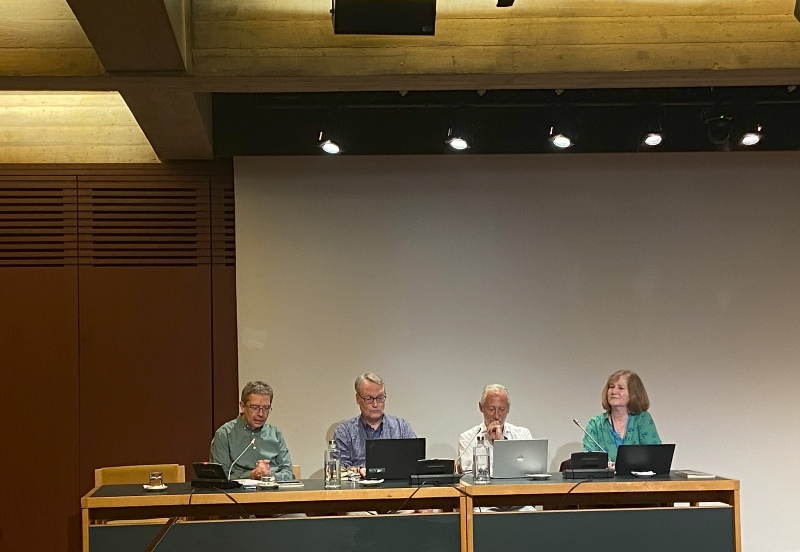
LOC/FLAD Roundtable: Revisiting Juan Linz's Theories of Regimes
Watch the Revisiting Juan Linz's Theories of Regimes Video
Sponsored by the Luso-American Development Foundation (FLAD), another key event on the second day was the LOC/FLAD Roundtable titled Revisiting Juan Linz's Theories of Regimes. Chaired by António Costa Pinto (Institute of Social Sciences, University of Lisbon), the roundtable honored the lasting influence of Juan Linz’s work, particularly his groundbreaking contributions to the study of political regimes. Linz's tripartite theory of regimes was the first to distinguish between totalitarian, autocratic, and democratic regimes and remains a cornerstone of comparative politics. On the 50th anniversary of the third wave of democratization, speakers looked at Linz's conceptual innovations and examined their applicability to the current wave of autocratization. Speakers included Jennifer McCoy (Georgia State University, United States), Andreas Schedler (Central European University, Austria), Giovanni Capoccia (University of Oxford, United Kingdom), and Mark Thompson (City University of Hong Kong, Hong Kong S.A.R).
Giovanni Capoccia discussed the relevance of Linz's distinctions between regime types in understanding contemporary autocratic and hybrid regimes. He provided a critical reassessment of how these categories can be applied to analyze recent authoritarian trends and shifts.
Jennifer McCoy's analysis, based on Linz’s conceptualization of legitimacy, examined how political polarization erodes the legitimacy of democratic institutions. She illustrated how this polarization undermines democracy in countries such as Venezuela, Türkiye, and the United States, linking these dynamics to Linz’s regime typology.
Andreas Schedler discussed the challenges of identifying genuine democratic actors in an era where the concept of democracy has become a universal ideal. He reflected on how Linz's theories help to understand the fluidity of democratic norms and the ambiguities present in the identification of democratic practices.
Mark Thompson focused on the political developments in the Philippines, and explored how Linz’s framework assists in understanding transitions from authoritarianism to democracy.
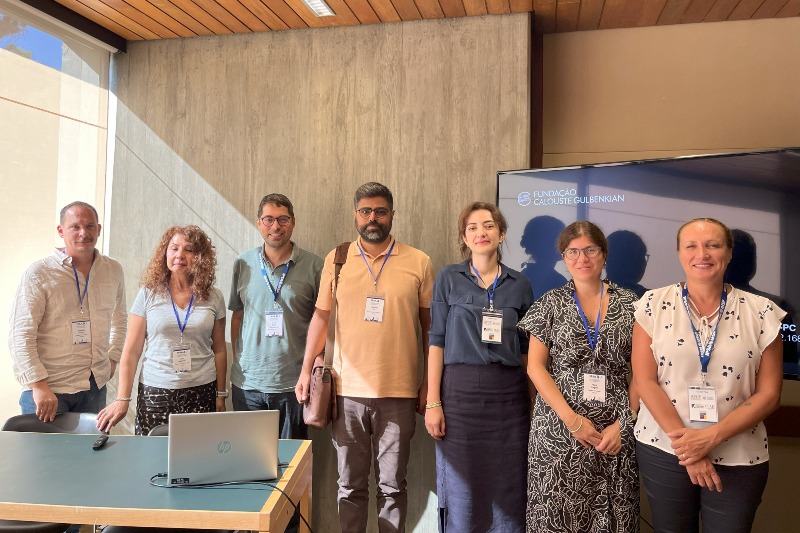
Panels
The second day of the conference featured 30 panels covering a wide range of topics, including the resilience of democratic institutions, the rise of digital authoritarianism, gender and authoritarianism, civilian control during political transitions, and the influence of migration, corruption, and nationalism on democratic and autocratic trends.
IPSA Executive Committee (EC) members once again played an active role in the discussions, contributing as chairs, presenters, and discussants. Hasret Dikici Bilgin, IPSA Summer Schools Coordinator, chaired the panel Türkiye: Democratic Resilience or Ruptures in Autocratization and presented her paper, Regime Survival and Class Politics in Autocratization. On the same panel, EC member Berk Esen also presented his research on Formal Yet Ineffective Opposition Coordination Under Competitive Authoritarianism: The Case of the Nation Alliance in Turkey.
IPSA Past President Lourdes Sola participated in the panel Domestic Institutions and the Management of Autocratic Trends, where she presented her paper, Reassessing Central Bank Doctrine and Practices as Paradigms Shift.
Daniel Stockemer, Co-Editor of the International Political Science Review (IPSR), served as a discussant in the panel The Impact of Increasing Authoritarian Conservatism on Gender Regime in Turkey.
Additionally, IPSA RC-EC Liaison Carmelo Cattafi chaired the panel Citizens and Identities in Democratization/Autocratization Trends, while Prof. Stockemer presented his paper, Are Young Populists Different? Investigating the Relationship Between Age and Populist Attitudes.
Day 3 | 13 September 2024
Watch the IPSA Roundtable: Conversation on the Impact of Political Science in Society
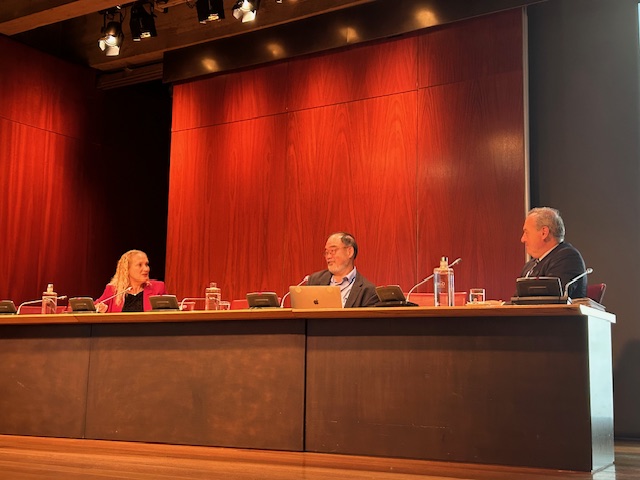
The final day of the Democratization and Autocratization conference began with the IPSA Roundtable: Conversation on the Impact of Political Science in Society: Could We Do Better?. Chaired by IPSA President Pablo Oñate, the roundtable featured two distinguished guests, John Ishiyama (University of North Texas, United States) and Hasret Dikici Bilgin (Istanbul Bilgi University, Türkiye, and IPSA Summer School Coordinator), to discuss the role and influence of political science in today’s world.
Pablo Oñate opened the discussion by underlining the role of political science in generating knowledge and educating future professionals but also noted the growing need for greater engagement in promoting democratic values. Prof. Oñate also expressed concern that political scientists may be focusing too much on publishing research, rather than making their work more accessible to the public..
Hasret Dikici Bilgin noted that in regions such as Europe and the Middle East, political parties tend to prioritize expert opinions from fields like medicine and economics over political science, suggesting that the discipline is not making a significant impact in these areas.
John Ishiyama observed that political science holds greater visibility in the U.S., with some politicians actively seeking insights from the field. He highlighted the importance of improving communication between political scientists and the public, using platforms like the “Monkey Cage” blog to make academic research more accessible.
The roundtable concluded with a discussion of the role of academic organizations like IPSA in safeguarding academic freedom and advancing civic education. In the Q&A session, attendees raised questions about the evolution of political science, the challenges of teaching systematic strategies, and the relevance of social sciences in today's world.
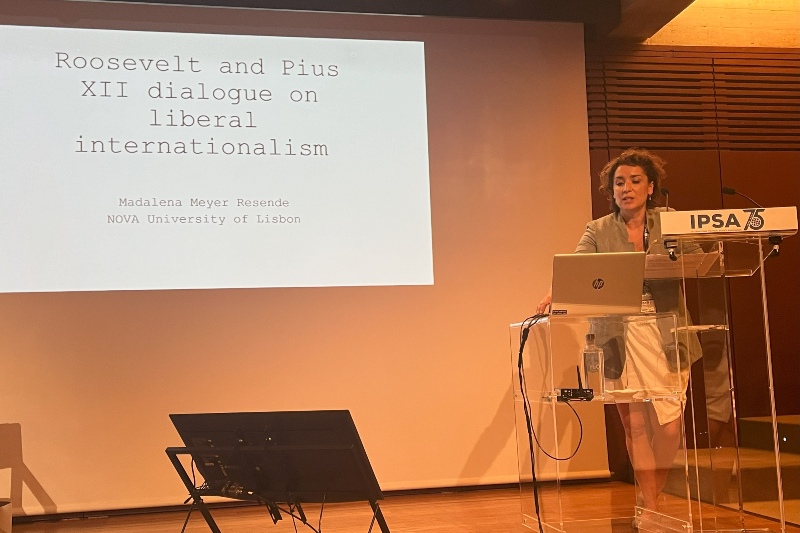
Panels
On the final day of the conference, 23 panel discussions were held, focusing on topics such as the historical and contemporary challenges of regime change, the impact of populism on democratic erosion, and the evolving role of foreign policy in democratic backsliding. The panels also examined the influence of political economy, civil society, and religious actors in shaping both democratic and autocratic trends.
Several members of the IPSA Executive Committee (EC) played active roles in these discussions. IPSA Vice-President and President of the Portuguese Political Science Association (APCP), Madalena Meyer Resende, presented a paper on How the Catholic Church Shaped the World: Pius XII and Roosevelt and the Making of the Post-War Order in the panel Democracy and Dictatorship after Social Revolution, War, and Empire: Short and Long-Run Legacies I. She also served as a discussant for the panel Religious Actors in the Third Wave of Autocratization.
Magdalena Musiał-Karg chaired the panel Perils of Direct Democracy, while Jesús Tovar Mendoza served as a discussant. Prof. Musiał-Karg also presented her research, The Backsliding of Direct Democracy in Poland: The Case of the 2023 Polish Referendum.
Emilia Palonen contributed with a paper on Populism: Between the Context and the Form? at the panel Populist Narratives and Political Cultures: Disputing Hegemony through Political Myth and Emotions. Lastly, Vanessa Elias de Oliveira presented a paper on Interaction between Organized Civil Society and Judicial Institutions in Brazil: Environmental Issues during Bolsonaro’s Years at the Civil Society and Democracy panel.
Closing Remarks
Watch the Closing Remarks Video
The conference concluded with a series of closing remarks.
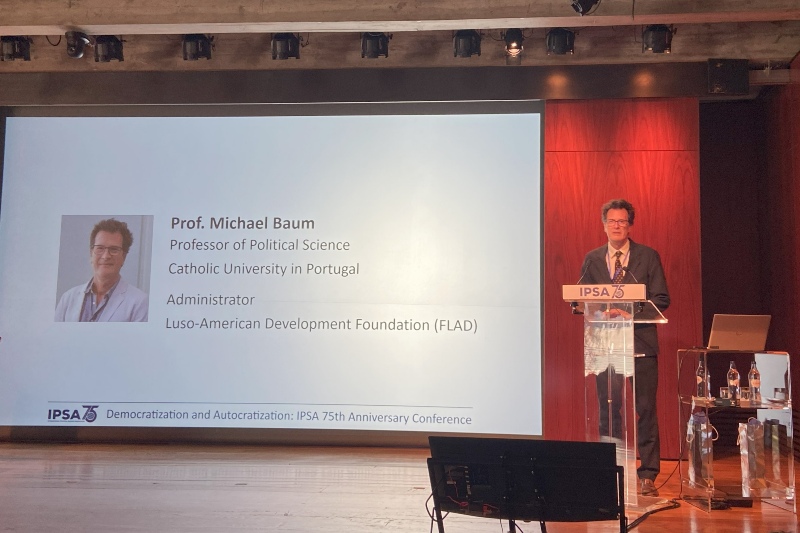 Michael Baum, the Luso-American Development Foundation
Michael Baum, the Luso-American Development Foundation
Representing one of the sponsors of the conference, the Luso-American Development Foundation, Michael Baum was the first to take the stage during the closing ceremony. In his speech, Prof. Baum presented an overview of FLAD's activities aimed at supporting researchers in political science. He also discussed the foundation's vital role in fostering academic research and collaboration.
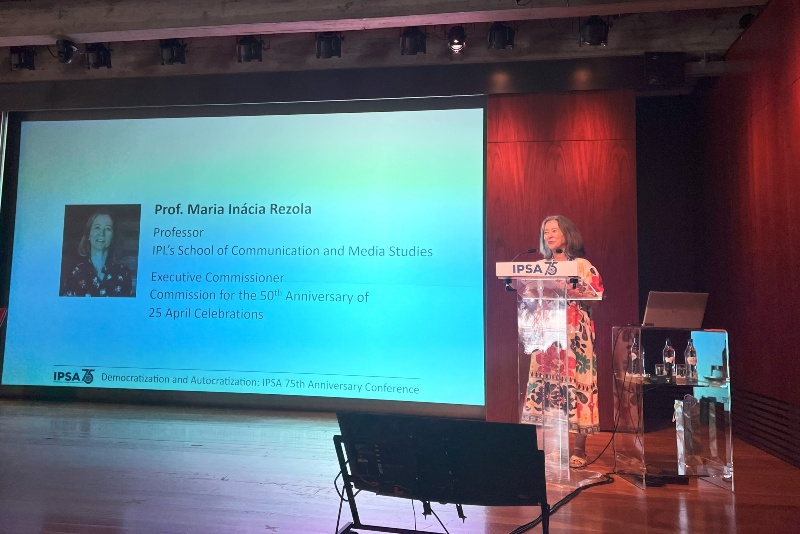 Maria Inacia Rezola, Chair of the 50th Anniversary of the Carnation Revolution
Maria Inacia Rezola, Chair of the 50th Anniversary of the Carnation Revolution
The second speaker, Maria Inácia Rezola, Professor IPL’s School of Communication and Media Studies and Executive Commissioner, Commission for the 50th Anniversary of April 25 Celebrations, provided insights into the historical significance of the Carnation Revolution, emphasizing its central role in the transition to democracy in Portugal. Additionally, Prof. Rezola highlighted the revolution as a key research object in understanding democratic evolution.
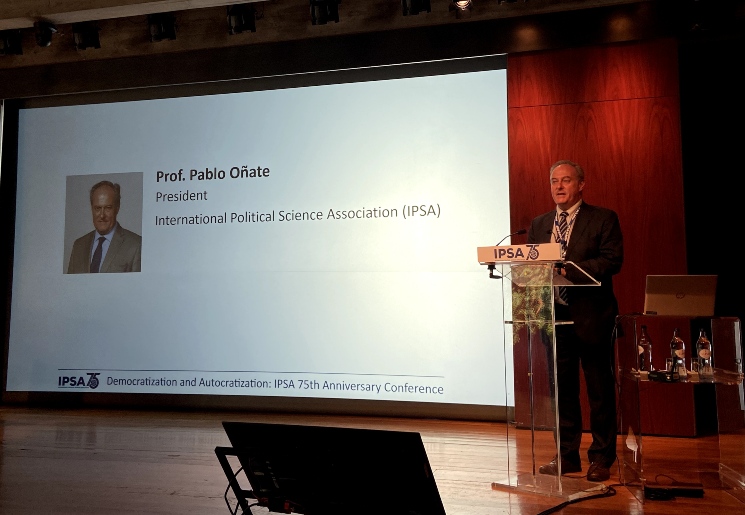 Pablo Oñate, IPSA President
Pablo Oñate, IPSA President
Finally, Pablo Oñate, IPSA President and Program Committee Chair of the 75th anniversary Lisbon Conference took the stage to express his heartfelt gratitude to his fellow Program Committee members: Yuko Kasuya, IPSA President-Elect and Professor of Political Science at Keio University; Dianne Pinderhughes, IPSA President, Professor of political science at University of Notre Dame; Madalena Meyer Resende, IPSA Vice-President, Professor of political science at NOVA University of Lisbon; Keiichi Kubo, IPSA Committee for Research and Training Chair, Professor of political science at Waseda University; Hasret Dikici-Bilgin, IPSA Summer Schools Coordinator, Professor of political science at Istanbul Bilgi University; and and Daniel Stockemer, Co-editor of International Political Science Review and Professor of Political Science at the University of Ottawa.
Prof. Oñate also thanked the IPSA Secretariat staff for their dedication and hard work, as well as the sponsors, partners, and exhibitors whose support was instrumental in making the conference a success. He finally, extended a warm invitation to all conference participants to join the 2025 IPSA World Congress of Political Science in Seoul, South Korea.



.png)
